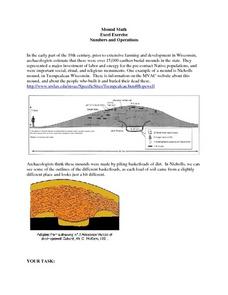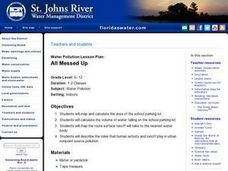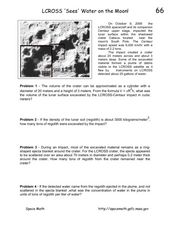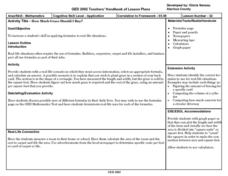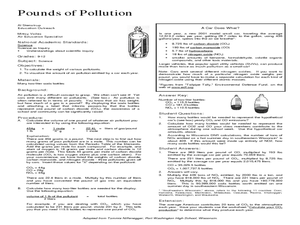Curated OER
Mound Math
Students examine the many different burial mounds in Wisconsin. In groups, they use the internet to discover how long it took to build a specific mound. They must calculate the measurements of the mound to make a scale model.
Curated OER
All Messed Up
Students begin the experiment by mapping and calculating their school parking lot. They calculate the volume of water falling on the lot and map the route the water runoff takes. They discuss the roles that humans play in affecting water...
Curated OER
Penny's Box
Learners need to be able to calculate the volume and surface area of a cuboid as well as present a systematic list of results in order to justify the minimum case. The use of three factors of 100 is also important.
Curated OER
BY THE POUND
The student will estimate the weight and cost of produce and calculate the actual price.Discuss the difference between weight and volume. Have students discuss whether it is more economical to buy produce by the pound, by the piece or...
Curated OER
Micropipette and the Metric System
Students practice measuring the correct volume using micropipette. In this biology lesson plan, students determine the correct micropipette tip to use when transferring fluid. They convert metric volume from one unit to another.
Curated OER
Stoichiometry
In this stoichiometry worksheet, students calculate balance the chemical equations and then calculate the moles needed to complete or activate the chemical reaction. Students also calculate the volume or grams needed for each chemical...
Curated OER
Nature's Air Conditioner
Students observe the process of transpiration in leaves. They measure how much water a leaf gives off in a 24-hour period, calculate the volume, and answer discussion questions.
Curated OER
Gas Laws
Eighth graders use lab work and software to collect and analyze pressure and temperature data in order to illustrate the relationship between the temperature and pressure of a gas at a constant volume. They conduct a lab and organize...
Curated OER
Density
Young scholars work with a partner to record observations on various materials. Working together, they calculate the mass and volume of each material and then combine them and shake them for a period of time. In their journals, they...
Curated OER
Math Under Pressure
Students are told that an air tank contains a fixed volume of air under pressure. As air is used, the pressure decreases at a rate that depends on the depth. Students discuss how SCUBA divers calculate the amount of time they can spend...
Curated OER
Pea Brain! Explorations in Estimation
Students estimate how many peas fit in a container. In this science lesson, students calculate the weight of a pea and record it. They use this data to calculate how many peas fit in a human brain.
Curated OER
Density
Learners, in groups, design a procedure to calculate the mass of gas molecules in the classroom by measuring the volume of the classroom and researching the density of air. They apply changes in air density with altitude and effects on a...
Curated OER
Evaporation Pans & Related Rates
Students calculate evaporation rate using differential equations. In this calculus lesson plan, students explain how pan evaporation works. They complete a worksheet to sum up the lesson plan.
Curated OER
Perimeter and Area of Similar Figures
Students explore the relationships between similar figures. In this relationships between similar figures lesson, students discuss relationships between perimeter, circumference, area, surface area, and volume of similar figures through...
Curated OER
LCROSS 'Sees" Water on the Moon!
In this moon worksheet, students calculate information about the crater that was created by a massive impact. This worksheet has 3 problems to solve.
Curated OER
Glacial Change
Students research the ways in which scientists study glaciers and glacial change. They interpret real time data and calculate the estimated global sea level rise potential. A very good instructional activity to illustrate global warming.
Curated OER
How Much Grass Should I Buy?
Students examine a variety of real life situations in which they must access information, select an appropriate formula, and calculate an answer. A rectangular piece of grass provides an opportunity for the exploration of this lesson.
Curated OER
Parking Meters
Third graders are introduced to the problem with a short discussion about parking. They then solve with a partner. As they work ask questions that focus on the strategies they are using to make the calculations.
Curated OER
Energy in the Form of Calories
Young scholars calculate the amount of food calories found in an individual peanut. In small groups, they set up the experiment so that a burning peanut will heat water above it. Using the temperature change and volume of the water they...
Curated OER
Pounds of Pollution
Students examine pollutants and investigate air pollution emitted by a car in a year. In this air pollution lesson students complete an activity and make calculations.
Curated OER
The Numbers Game
Students examine how to calculate the part-per-million and part-per-billion units used to measure contaminant concentrations in the environment. They calculate ratios, take a quiz, analyze a sample chemical spill, and determine if...
Curated OER
The Chicken Run
Fourth graders work in a group of 4 to make rectangle with a 12m length of string. They discuss its perimeter and how they would calculate its area. Then another group of 4 make another rectangle and estimate if the area would be greater...
Curated OER
Teaching Students How to Read the Protein Concentration in a Sample
Students work together to identify proteins in different samples. They calculate the protein concentration in those samples as well. They complete discussion questions to end the lesson.
Curated OER
The Buoyancy Factor
Students examine why some objects float in water while others sink and the ability of something to float does not depend entirely on its weight. Archimedes' principle is introduced and buoyant force is discussed. Practice calculations...
